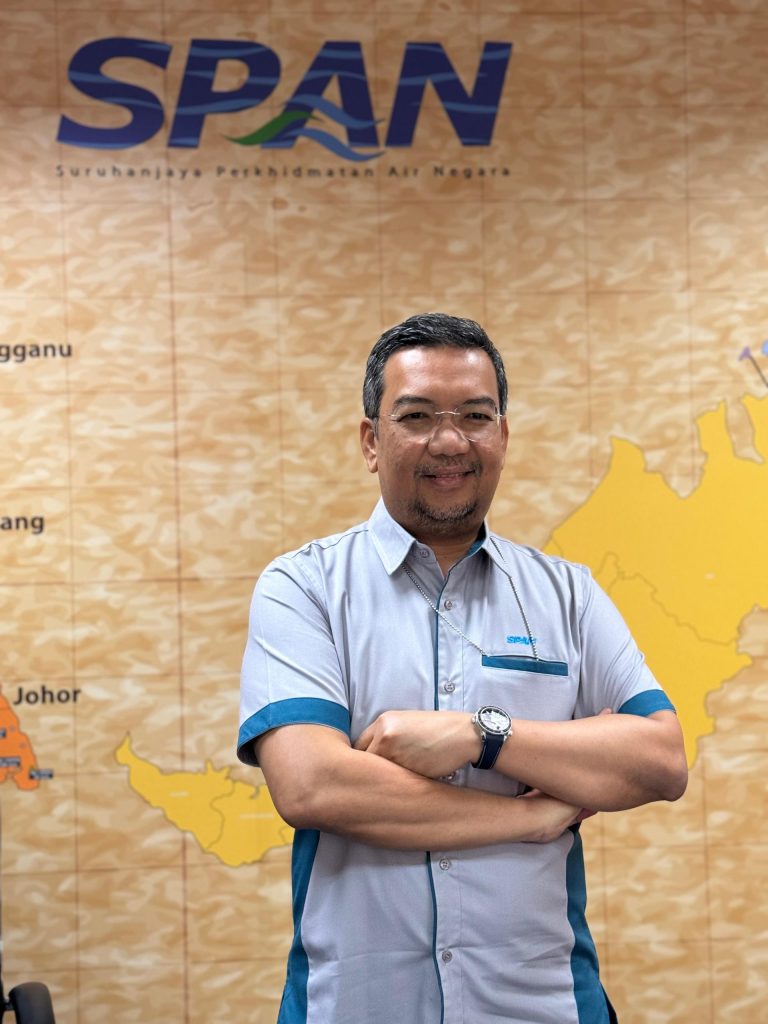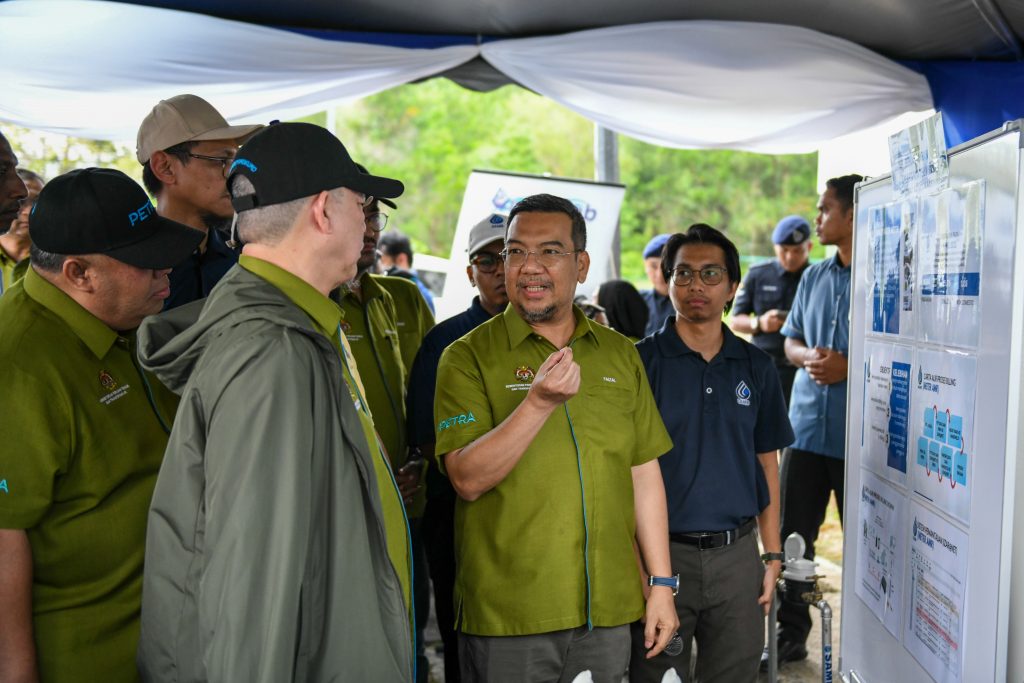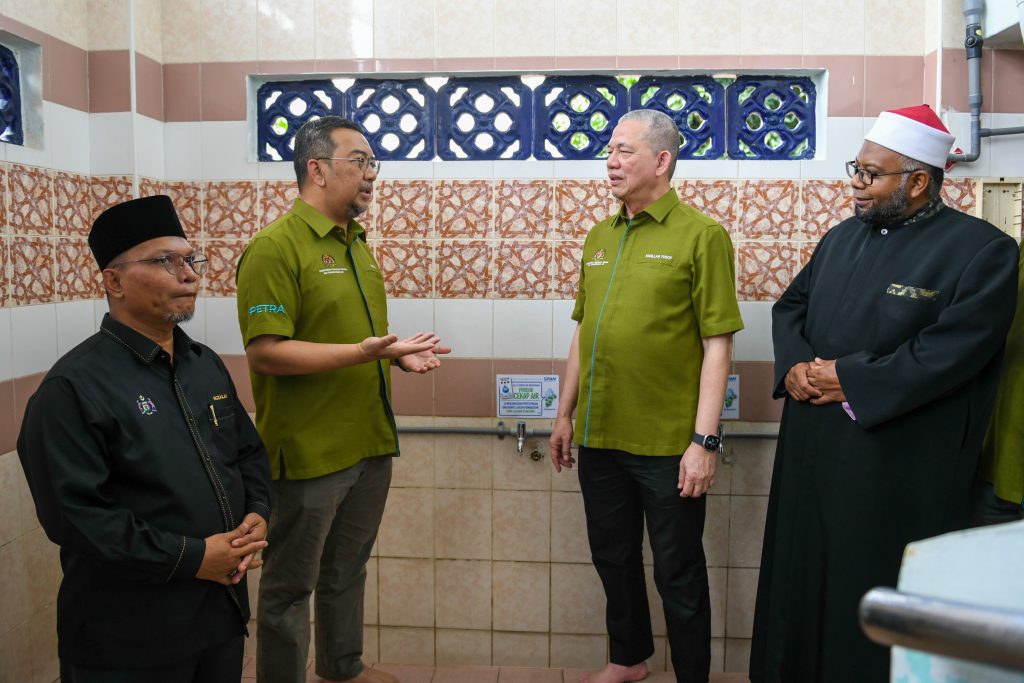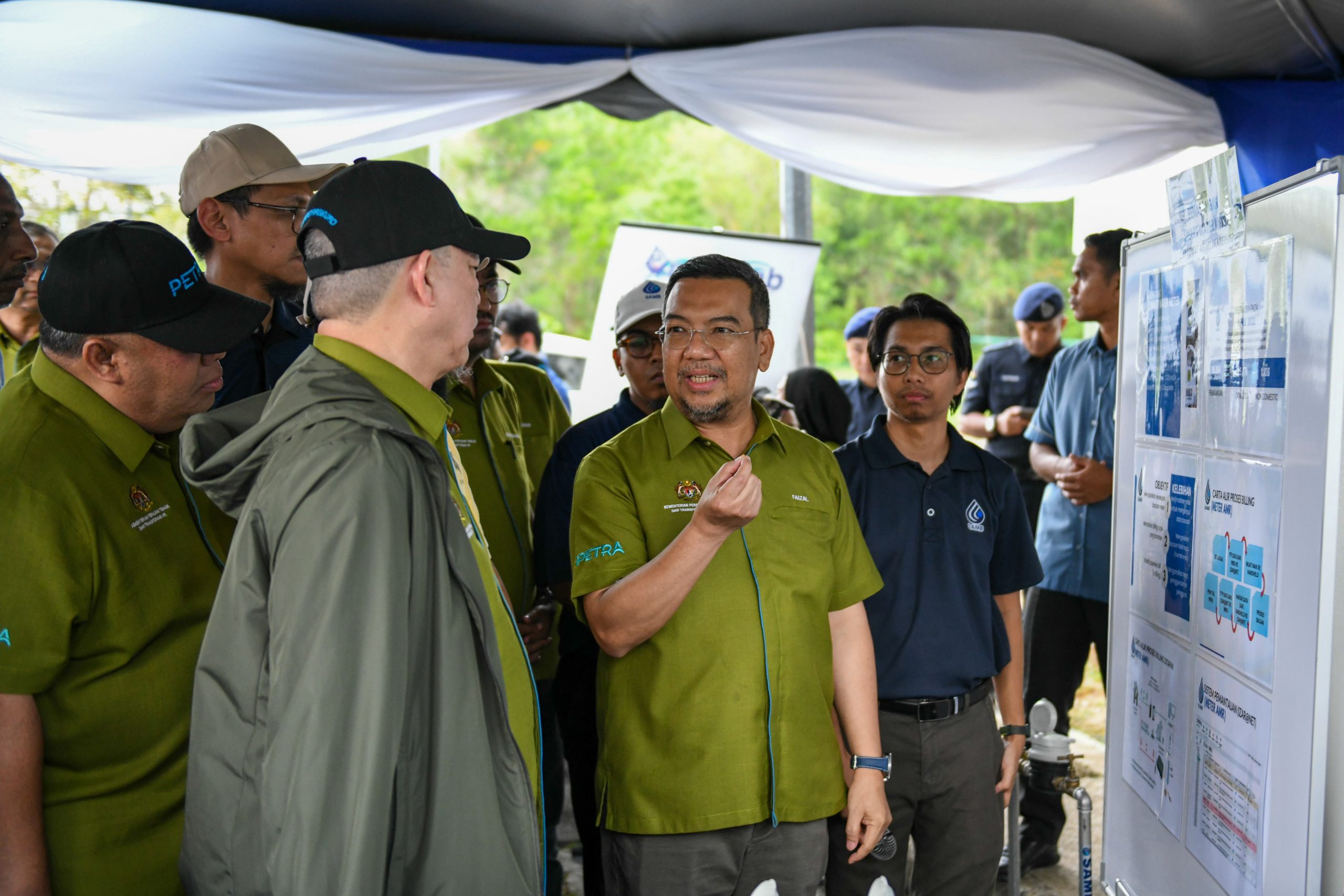SPAN: Leading Malaysia Towards a Sustainable and Water-secure Future
The National Water Services Commission (SPAN) of Malaysia was established in March 2007 to serve as the technical and economic regulatory body for water supply and sewerage services in Peninsular Malaysia and the Federal Territory of Labuan. Asian Water had the opportunity to talk to the CEO of SPAN, Dato’ Haji Ahmad Faizal bin Abdul Rahman, recently on SPAN and the water industry in Malaysia.

Asian Water: Can you briefly describe what the National Water Services Commission (SPAN) does and what are its aims?
Dato’ Haji Ahmad Faizal: The National Water Services Commission (SPAN) is a technical and economic regulatory body for water supply and sewerage services in Peninsular Malaysia and the Federal Territory of Labuan. SPAN is an agency under the Ministry of Energy Transition and Water Transformation (PETRA). It regulates the water services industry in accordance with the Water Services Industry Act 2006 (Act 655), which came into effect on 1 January 2008.
SPAN oversees all entities within the water supply and sewerage services industry, including public and private water supply and sewerage service operators, water supply and sewerage contractors, permit holders, and suppliers of water and sewerage products.
Suruhanjaya Perkhidmatan Air Negara Act 2006 (Act 654) outlines the following provisions in relation to the Commission’s functions:
- to advise the Minister on all matters in relation to the national policy objectives of water supply and sewerage services laws and to implement and promote the national policy objectives;
- to implement and enforce the water supply and sewerage services laws and to consider and recommend reforms to the water supply and sewerage services laws;
- to ensure the productivity of the water supply and sewerage services industry and the monitoring of operators’ compliance with stipulated standards, contractual obligations and relevant laws and guidelines;
- to increase concerted efforts towards improving operational efficiency of the industry in particular the reduction of non-revenue water through short term, medium term and long term programmes;
- to advise the Minister on a fair and efficient mechanism for the determination of tariffs that is fair to both consumers and licensees and to implement tariffs that have been established through appropriate mechanism and tools;
- to ensure the national development goals pertaining to coverage, supply and access to water supply services and sewerage services are achieved;
- to ensure long-term sustainability of quality of water and sewerage services through continued capital works development;
- to formulate and implement a plan to ensure all reasonable demands for sewerage services are satisfied and in consultation with relevant authorities, prepare a sewerage catchment plan formulating the policy and general proposals in respect of the development of any new sewerage system and measures for improvement of any existing sewerage system;
- to carry out any function conferred upon it under any other written law; and
- to advise the Minister generally on matters relating to water supply and sewerage services.

Asian Water: As the CEO of SPAN, what are your roles and responsibilities?
Dato’ Haji Ahmad Faizal: As the CEO of SPAN, my responsibility is to oversee the effective functioning of the organisation, ensure the achievement of its objectives and manage its operations. Here are some of my responsibilities:
- Leadership and strategic direction
- Provide leadership to SPAN, setting the direction and strategic goals.
- Develop and implement plans and programmes to enhance water and sewerage services.
- Ensure that SPAN’s activities align with the national policy objectives for the water services industry.
- Regulation and oversight
- Oversee the regulatory framework by ensuring that industry players comply with Act 655 and its subsidiary rules and regulations.
- Ensure that water and sewerage operators meet the Key Performance Indicators (KPIs) set by SPAN.
- Ensure private water supply and sewerage service operators, water supply and sewerage contractors, permit holders, and suppliers of water and sewerage products meet the required standards and guidelines.
- Address consumer complaints and grievances in relation to service quality.
- Stakeholder engagement
- Communicate SPAN’s vision, mission, goals, and outcomes to the public and key stakeholders.
- Foster relationships with industry stakeholders, such as state water operators, sewerage operators, Federal Government, government agencies, local governments and international bodies.
- Promoting sustainability
- Advocate for sustainable water management practices, conservation and efficient infrastructure.
- Guide efforts for the protection of water resources.
In summary, as the CEO of SPAN, my role is to lead the organisation in ensuring an efficient, sustainable and well-regulated water and sewerage services industry that meets the needs of the nation and its people.

Asian Water: The Water Services Industry Act 2006 (Act 655) was enforced in 2008. Since then, how effective has the Act been in regulating the water services industry in Malaysia?
Dato’ Haji Ahmad Faizal: The Water Services Industry Act 2006 (Act 655), which came into force in 2008, was a significant piece of legislation aimed at regulating and improving the water supply and sewerage services in Peninsular Malaysia and the Federal Territory of Labuan. The Act provided the legal framework for SPAN to oversee and regulate these services. Since its enforcement, the Act has had a significant impact on the industry. Below are some key areas where the Act has been effective, along with challenges that remain.
- Restructuring of Water Supply Services Industry
The reform undertaken in the water services industry aims to ensure its long-term sustainability and the provision of quality services to consumers. The Federal Government has set a policy direction for the restructuring to be based on the asset-light model, where the operators will transfer all the encumbered water assets and related liabilities to Pengurusan Aset Air Berhad (PAAB). PAAB will then lease the assets back to the operators at a reasonable rate for operations and maintenance. The Federal Government has also permitted operators who are more efficient and financially viable, to operate as partial asset-light and they are expected to achieve full-cost recovery earlier than the other operators. The funding model was designed to assist water services operators to improve the service delivery by focusing on operations, to enhance efficiency and achieve cost effectiveness where capital expenditure (CAPEX) will be financed by PAAB at competitive funding costs.
As of 31 December 2023, a total of 10 states namely Melaka, Negeri Sembilan, Johor, Pulau Pinang, Perak, Kelantan, Selangor, Pahang, Kedah and Perlis have completed their restructuring and signed asset transfer agreement with PAAB.
- Improve in performance such as
- Non-Revenue Water (NRW)

- Water Supply Services Coverage

- Introduction of Tariff Setting Mechanism
The mechanism ensures water pricing is fair and reflective of the costs of providing the services. This mechanism aims to achieve a balance between affordability for consumers and the financial sustainability of water operators.
Asian Water: What are the challenges faced by SPAN in regulating the water services in the country?
Dato’ Haji Ahmad Faizal: Amongst the challenges are:
- Water Scarcity
Malaysia faces periodic water shortages due to factors such as climate change, droughts and uneven distribution of rainfall.
- Water Pollution
Pollution from various sources can contaminate water bodies, affecting both water quality and ecosystem health.
- Ageing Infrastructure
Ageing water infrastructure can lead to leaks, wastage and inefficiencies in water distribution.
By taking these actions, SPAN aims to achieve holistic water management that ensures a sustainable supply of clean water while addressing challenges related to scarcity, pollution and ageing infrastructure in Malaysia.
Here are some of the actions taken:
- Policy and Regulatory Framework
SPAN has developed comprehensive policies and regulations to ensure sustainable water management. SPAN has set up a Sustainability Division to ensure continuous, uninterrupted, good quality water to meet the supply and demand needs. This supply and demand needs should not only be sufficient for now or the short term but is needed to enable future generations to meet their own needs.
If we don’t take care of the water cycle, it will not take care of our water cycle. Ensuring sustainability of water is a shared responsibility. Everyone has a role to play in conserving and protecting our waters, from the general public to the private sector.
- Water Resource Planning
SPAN encourages water operators to develop long-term water resource plans that consider factors like demand projections, supply sources and conservation measures. CAPEX projects are listed in the service licensees 5-year Business Plan. SPAN approves the CAPEX listing based on the demand and supply needs of the area and financial capability to repay the lease rental to the Facility Licensee.
Adopt integrated water resources management (IWRM) approach that considers the entire water cycle, including surface water, groundwater and wastewater and manage water resources in a holistic manner that takes into account social, economic and environmental considerations.
- Public Awareness and Education
Limiting use of water is very much linked to the social aspect that is associated with consumers. In many countries including Malaysia, the price of water tends to be low. This unfortunately makes way for wastage of water. How do we curb this from happening? Encouraging consumers to conserve water can help reduce the overall demand for water and the associated energy use and emissions. This could include promoting water-efficient appliances, implementing water pricing policies that reflect the true cost of water, and educating consumers on the importance of water conservation.
Increasing public awareness and understanding of the importance of water conservation is essential to achieve sustainable water management in Malaysia. This can be done through education campaigns, public outreach programmes and by promoting water-saving technologies. Intensify Communication, Educational and Public Awareness (CEPA) through strategic collaboration with relevant stakeholders, including promoting sustainable water consumption and enhancing the public’s role in water management. Involving local communities, businesses and government agencies in the planning and decision-making process to ensure that water management plans are equitable and inclusive.
WEPLS is a voluntary Water Efficient Product Labelling Scheme initiated by SPAN to register and label water efficient products according to the guidelines set by SPAN. WEPLS label serves to inform consumers of the product’s water efficiency rating and the consumers will be able to take these factors into account when making their purchasing decision. Five (5) types of products are covered under WEPLS, namely water taps which include basin tap, sink tap, shower tap and ablution tap, water closet, urinal equipment, shower heads and clothes washing machine.
- Demand Management Programmes
SPAN encourages water operators to implement demand management programmes, including leak detection and repair, water-saving technologies and customer engagement initiatives. When less water is used, it indirectly delays the need to provide new resources.
Some of the efforts that have been embarked upon is fair water pricing mechanisms that reflect the true cost of water via Tariff Setting Mechanism, encouragement of adoption of water-efficient practices and technologies in households and industries, such as the use of low-flow taps, showerheads, urinal and water closets, rainwater harvesting systems and efficient irrigation systems, increase public awareness and educate the young (school children) on the importance of water conservation. In scaling up the efficient use of water, the government is looking at rebate/tax exemption such as Green Technology Financing Scheme, Green Investment Tax Allowance (Green Income Tax Exemption).
- Efficiency Improvements
SPAN sets efficiency targets for water operators, encouraging them to reduce water losses through improved infrastructure and management practices. Reducing water loss in the distribution system can help reduce energy use and emissions by reducing the need for pumping and treatment of water. This could include repairing leaks, optimising distribution system pressure and implementing smart water management technologies. Initiatives to reduce water wastage due to non-revenue water (NRW). It is directly possible to reduce the use of electricity for the water treatment process and further reduce the carbon footprint. The 12th Malaysia Plan consists of NRW Programme Approach 1 (grant from the Ministry) and Approach 2 (Matching Grant). Under Approach 2, the Federal Government has prepared an allocation of RM1.371 billion in matching grants to help water operators overcome the NRW issue more effectively and sustainably and involves states with an NRW rate of under 40% namely Melaka, Penang, Johor, Negeri Sembilan, Perak, Terengganu and Selangor.
- Water Quality Monitoring
SPAN oversees water quality monitoring programmes to ensure that drinking water meets safety standards. This involves regular testing and reporting of water quality parameters. SPAN has included this as a performance measurement KPI that is evaluated when the operators renew their service license.
- Emergency Preparedness
SPAN collaborates with water operators to develop contingency plans for handling water shortages and emergencies. Water Safety Plan (WSP) has been developed by SPAN to facilitate the establishment of uniform and comprehensive WSP documents by all water operators which includes public and private water supply operators. WSP is a tool for setting up effective risk management which includes identification of associated risks in every aspect of the water supply system followed by planning of mitigation measures in a systematic manner to ensure the safety and security of water supply to consumers.
- Stakeholder Collaboration
SPAN fosters collaboration between government agencies, water operators, NGOs and other stakeholders to address water management challenges collectively. SPAN is looking into mechanisms to diversify water sources. Adoption of rainwater harvesting to reduce reliance on traditional water sources and can alleviate flooding in urban areas. Other than this, desalination to increase availability of freshwater, groundwater extraction to supplement surface water sources and reuse of treated effluent for non-potable use to reduce demand on treated water is being actively ventured upon by SPAN.
- Research and Innovation
SPAN supports research initiatives to develop innovative technologies and solutions for sustainable water management. Utilisation of advanced technologies such as remote sensing, Geographic Information Systems (GIS) to improve water resource assessments and implementing smart water management systems to monitor water use and optimise water distribution. Enhancing capability in data-driven decision making such as the development of Data Industri Perkhidmatan Air Negara Spatial Mapping Interactive (DIPAN-SMI) and creating a water research institute [National Water Research Institute of Malaysia (NAHRIM)].
Implementing smart metering systems allows for real-time monitoring of water consumption and the identification of leakages or abnormal usage patterns. Smart meters can help utilities improve water management, detect and address issues promptly, and enable more accurate billing based on actual consumption. Leveraging smart metering and monitoring technologies for real time water consumption data, leakage detection and improved billing accuracy.

Asian Water: What are the current national development goals pertaining to the coverage, supply and access to water supply and sewerage? In your opinion, are the goals achievable?
Dato’ Haji Ahmad Faizal: Current National Development Goals for Water Supply and Sewerage are:
- Access to Clean and Safe Water Supply
- Ensure water supply services coverage – 97.1% in 2023 to 98% in 2025.
- Prioritize uninterrupted access to treated water to meet the daily needs of the growing population.
- Improved sewerage system coverage
- Expand access to efficient sewerage services to ensure proper waste management and prevent environmental pollution.
- Achieve a higher percentage of connected sewerage systems in urban and suburban areas while upgrading older infrastructure.
- As of 2023, the connected sewerage services covered 86.9 % in major cities and we aim to achieve 98% coverage by 2025.
- Sustainability of water resources
- Enhance water resource management to ensure long-term sustainability and resilience against water scarcity and climate change.
- Promote initiatives to reduce non-revenue water (NRW) losses from 37.2% (national level) in 2023 to 25% in 2030.
- Promote initiative to reduce water consumption per capita from 228 liters per capita per day in 2023 to 160 liters per capita per day in 2040
- Affordability and reliability
- Ensure water and sewerage services remain affordable while maintaining high standards of reliability, efficiency, and service quality.
- Adoption of technology and innovation
- Incorporate smart technologies and innovative solutions in the water and sewerage sectors to improve service delivery, monitoring, and sustainability.
- Encourage green initiatives, such as water recycling and the reuse of treated wastewater.
In my opinion, the goals are challenging but achievable with proper implementation, collaboration, and resource management.
Asian Water: What are your views on the water services industry in Malaysia? And what are your hopes for the future of the industry?
Dato’ Haji Ahmad Faizal: The water services industry in Malaysia plays a crucial role in ensuring the nation’s development, ensuring public health, environmental sustainability and economic growth. Over the years, the industry has made commendable progress, particularly in delivering clean water and sewerage services to the growing population and economic sectors. However, it faces several challenges that need to be addressed to meet the growing demands of a modern and sustainable Malaysia.
As mentioned in no. 4, SPAN has conducted various initiatives to overcome the challenges. The future of Malaysia’s water services industry depends on the collective efforts from all parties. By addressing current challenges and leveraging innovation, the industry can lead Malaysia towards a sustainable and water-secure future.

